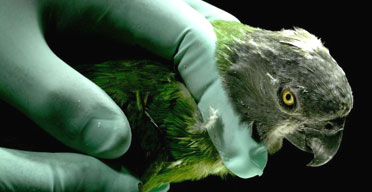
Vets advising the European commission will decide by tomorrow night whether importing live wild birds into the EU should be banned, following confirmation that the most lethal strain of avian flu killed a parrot in a UK quarantine unit.
Scientists revealed last night that at least one parrot that died last week had a strain of the H5N1 virus they had not seen before. This was closer to one found in China than those seen recently in Turkey and Romania. The parrot was probably infected by birds from a separate consignment of birds from Taiwan sharing "airspace" with parrots and other birds from Surinam, South America.
Urgent checks are being made on about 2,000 imported birds in quarantine facilities across Britain. Ministers had been considering suspending imports of birds for collectors, exhibitors and pet lovers well before confirmation that the parrot had avian flu on Friday but revealed they made a formal request on Saturday.
Restrictions on bird markets, fairs and shows are likely also after Defra concluded there was a "high risk" of global dispersal of the virus and a risk to Britain. The flu is still a bird disease but one which scientists fear may mutate into a pandemic form that easily spreads between humans.
Debby Reynolds, the chief vet, also revealed that scientists were in close touch with Customs officials because of fears the virus might enter through smuggled birds.
But Britain will not yet follow the example of other EU countries, such as Germany and Poland, in restricting the movement of free-range poultry flocks.
The possible measure is being kept under review "with a high state of vigilance", Dr Reynolds said last night. Thousands of wild birds have been routinely tested for avian flu in Britain over the past two years
On the parrot test results, Defra said: "The closest strain is one identified in ducks in China earlier this year. It is not so similar to strains isolated in Romania and Turkey." Tests have to confirm whether birds in Greece and Croatia have the H5N1 version of the flu virus. Sweden said tests there revealed only mild form of bird flu. Investigations are under way as to how the Surinam bird contracted the disease.
Dr Reynolds said: "Our working hypothesis is that any infection of the birds is likely to have arisen in the quarantine system, most likely in the facility in Essex where the Surinam birds shared airspace with the birds from Taiwan."
Taiwan last week revealed it had found a case of bird flu in a container smuggled from China, its first case since 2003.
The infected parrot was one of two that died from a mixed consignment of 148 birds from Surinam on September 16. Another 216 other birds from Taiwan entered the unit 11 days later. Some of these birds also died earlier this month and tests on others culled last week are continuing. Tissues from the Surinam birds sent to government laboratories in Weybridge, Surrey were mixed as one sample and it is not clear whether one or both birds were infected.
The policy of different consignments sharing quarantine facilities will now be reviewed although officials insist these are secure and the 30-day quarantine period dates from the date of arrival of the last batch of birds to share units.
About 83,000 exotic birds are thought to have been imported into Britain in 2003, three times the figure of 2001.
Patricia Hewitt, the health secretary, told ITV's Jonathan Dimbleby programme yesterday the issue of countries producing their own generic antiviral drugs and bypassing patents owned by Roche for Tamiflu, the main antiviral being stockpiled, needed to be discussed.

